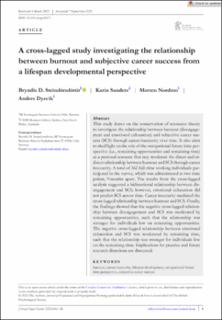A cross-lagged study investigating the relationship between burnout and subjective career success from a lifespan developmental perspective
Peer reviewed, Journal article
Published version
Permanent lenke
https://hdl.handle.net/11250/3093748Utgivelsesdato
2023Metadata
Vis full innførselSamlinger
- Scientific articles [2181]
Originalversjon
10.1111/joop.12471Sammendrag
This study draws on the conservation of resources theory to investigate the relationship between burnout (disengage-ment and emotional exhaustion) and subjective career suc-cess (SCS) through career insecurity over time. It also aims to shed light on the role of the occupational future time per-spective (i.e., remaining opportunities and remaining time) as a personal resource that may moderate the direct and in-direct relationship between burnout and SCS through career insecurity. A total of 362 full-time working individuals par-ticipated in the survey, which was administered at two time points, 9 months apart. The results from the cross-lagged analysis suggested a bidirectional relationship between dis-engagement and SCS; however, emotional exhaustion did not predict SCS across time. Career insecurity mediated the cross-lagged relationship between burnout and SCS. Finally, the findings showed that the negative cross-lagged relation-ship between disengagement and SCS was moderated by remaining opportunities, such that the relationship was stronger for individuals low on remaining opportunities. The negative cross-lagged relationship between emotional exhaustion and SCS was moderated by remaining time, such that the relationship was stronger for individuals low on the remaining time. Implications for practice and future research directions are discussed

